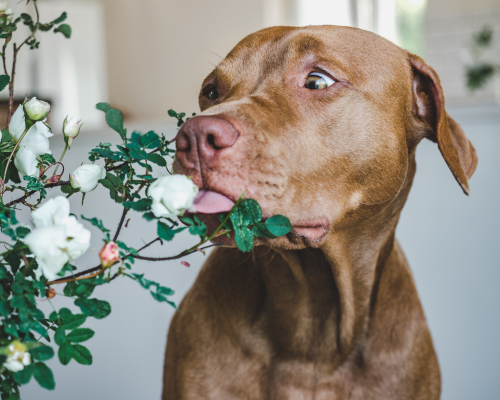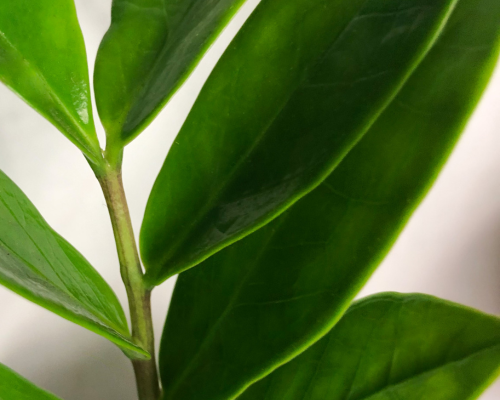My Dog Ate ZZ Plant What Should I Do? Explained!
My Dog Ate ZZ Plant What Should I Do? Explained!

Vet Reviewed

By: Sarah Hodgson
October 27, 2023
- Posted in Dogs
Table of Contents
We've all been there where our four-legged friends munch on stuff they shouldn't. Imagine your dog chomping down on your favorite ZZ plant. ZZ plants, those cool green air purifiers, are known for being tough, but they can be big trouble for our dogs. In this post, we'll check out what makes ZZ plants a risk for dogs.
Let's dive in!
What Is a ZZ Plant?
Before diving into the answer you came for, let's first understand what a ZZ plant is. The ZZ plant, which is known as Zamioculcas zamiifolia, is a popular houseplant.
It's a plant native to Eastern Africa however, what makes it so popular is its ability to tolerate low-light conditions. They are also aesthetic making them a great choice for indoor house plants.
Are ZZ Plants Toxic to Dogs?
ZZ plants are toxic to dogs. The roots, stems, and leaves of the ZZ plant contain toxins, which are toxic to both humans and animals. However, it is not fatal.
When ingested, these crystals can cause a range of symptoms in dogs, varying from mild to severe depending on the amount consumed and the size of the dog. However, as mentioned before it's not fatal even though it's toxic.

Potential Dangers of ZZ Plants for Dogs
If your dog ate a ZZ plant or just a small part of it, it can result in a variety of health issues due to its toxins. The calcium oxalate crystals in the plant can cause irritation and inflammation in the mouth, throat, and digestive tract of dogs.
Common symptoms may include drooling, pawing at the mouth, difficulty swallowing, vomiting, and diarrhea. In more severe cases, dogs may experience difficulty breathing, and swelling of the mouth and throat.
Signs That Your Dog Has Eaten a ZZ Plant
If you see leaves eaten and your dog experiencing some of the symptoms we'll mention there's a high chance he ate your ZZ plant.
There are a few signs you can look out for.
Vomiting may occur shortly after ingestion, as the plant can irritate the stomach. Diarrhea is another common symptom, as well as excessive drooling. Your dog may also exhibit signs of lethargy and loss of appetite. It's important to note that these symptoms can vary depending on the amount of plant ingested and the size of your dog. If you notice any of these signs, it's crucial to seek veterinary help.
Immediate Actions to Take if Your Dog Ingests a ZZ Plant
If you suspect that your dog has eaten a ZZ plant, it's important to act swiftly. Here are a couple of steps you can take.
1. Removing Any Remaining Plant Material From The Dog's Mouth
After removing any remaining plant material from the dog's mouth, it is important to carefully inspect the mouth and throat for any injuries or irritation caused by the ZZ plant. Gently rinse the mouth with water to remove any residue. If you notice any swelling, redness, or discomfort, it is advisable to seek veterinary assistance immediately. Additionally, observe your dog for any signs of difficulty breathing or swallowing. If any of these symptoms occur, contact your veterinarian as soon as possible.
2. Inducing Vomiting
Inducing vomiting is a critical step to take if your dog has ingested a ZZ plant. This can help remove any remaining plant material from their stomach and prevent further absorption of toxins. However, it is important to note that not all dogs can safely be induced to vomit, especially if they are showing severe symptoms or have underlying health conditions. It is best to consult with a veterinarian before attempting to induce vomiting.

3. Offering Activated Charcoal
After removing any remaining plant material from the dog's mouth and inducing vomiting, offering activated charcoal can help absorb any remaining toxins in the dog's system. Activated charcoal works by binding to the toxins and preventing their absorption in the gastrointestinal tract. It is important to follow the veterinarian's instructions on the proper dosage and administration of activated charcoal. Do not administer activated charcoal without consulting a veterinarian.
Contacting Your Veterinarian
When dealing with a potential plant toxicity case, it's always best to consult your veterinarian. They are the experts who can provide proper guidance based on your dog's specific situation. If your regular veterinarian is unavailable, contact an emergency veterinarian clinic or a pet poison control hotline for immediate assistance. The sooner you see professional help, the better the outcome.
The Bottom Line
So there you have it. ZZ plants may be a fun and lively addition to your home, but they can also pose a threat to your dog's health if ingested. It's crucial to be aware of the potential dangers and take immediate action if your dog consumes a ZZ plant.
By recognizing the signs, contacting your veterinarian, and taking preventive measures, you can ensure the well-being of your dog.

Subscribe to Petfluence!
Get updates on the latest posts and more from Petfluence straight to your inbox.